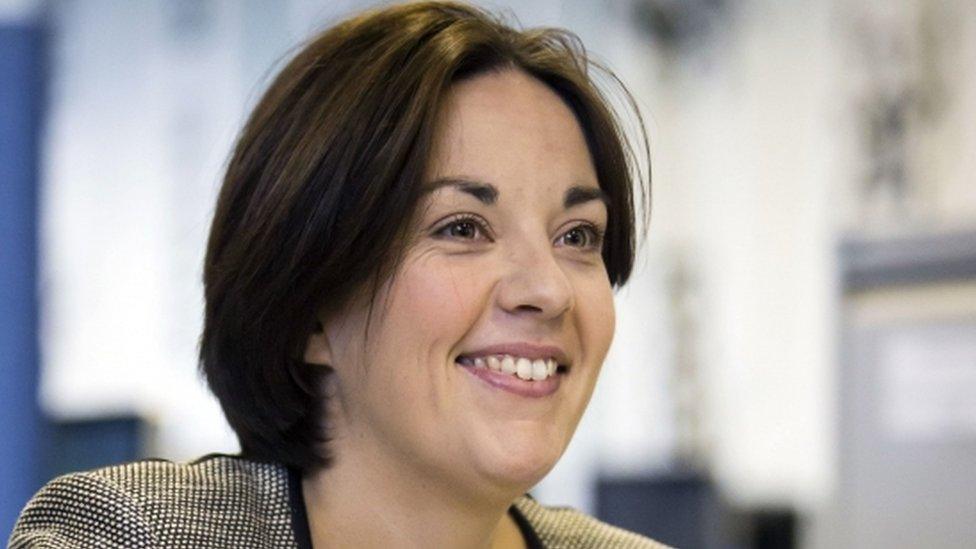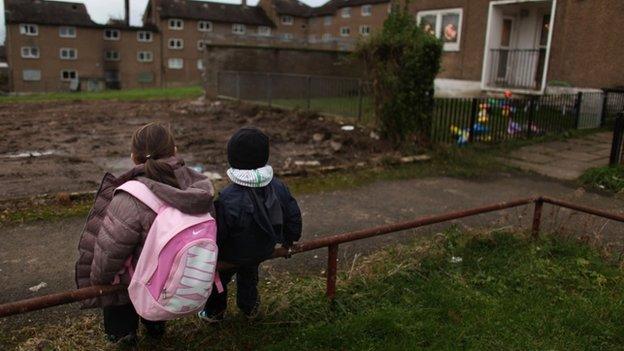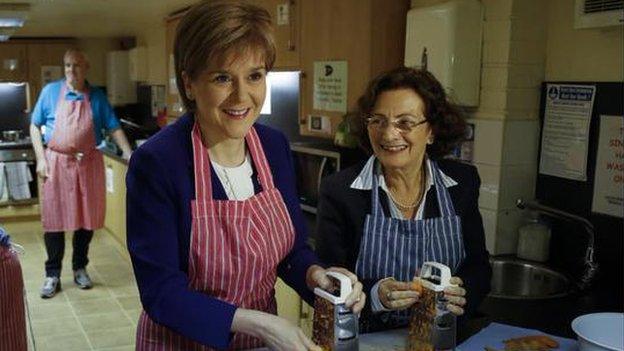Labour pledge to follow poverty plan after SNP delay
- Published

Kezia Dugdale issued a challenge to Nicola Sturgeon over the report
Scottish Labour has pledged to implement all the recommendations the Scottish government's poverty advisor made in January.
The SNP has said it will not issue a detailed response to Naomi Eisenstadt's report until after the election.
Labour leader Kezia Dugdale said she had written to Ms Eisenstadt committing to implementing all 15 recommendations.
The poverty report urged "bold" moves on tax reform, the living wage, childcare and public service delivery.
When the 'Shifting the Curve' report, external was released in January First Minister Nicola Sturgeon said the government would respond formally by the end of March.
However, after that deadline expired, Social Justice Secretary Alex Neil confirmed during an election hustings for Holyrood magazine, external that the SNP would only be making a "detailed response" to the full report if re-elected in May.
Poverty advice
Ms Dugdale said she had written to Oxford University research fellow Ms Eisenstadt committing to following her plan to alleviate poverty if Labour wins the election.
She said: "A Scottish Labour government will implement all 15 recommendations from the SNP's own anti-poverty tsar. Something even the SNP government has so far refused to do.
"So my challenge to Nicola Sturgeon is this - don't just talk about how anti-poverty you are. Actually do something about it and match Labour's plan.
"Risk upsetting the millionaires. Risk asking the wealthiest few to pay just a little bit more.
"Because the price of not doing it - more cuts to schools, thousands out of work and more children living in poverty - is just too great."

Government reports have found half a million Scots living in poverty, including 100,000 children
The report was sparked by concerns about poverty in Scotland, with recent government studies finding half a million Scots living in poverty, including 100,000 children.
Ms Eisenstadt called for more social housing to be built, a focus on expanding the living wage to larger employers, work to make sure people claim all the benefits they are entitled to, improved childcare, and "bold" reforms to council tax.
Mr Neil said the SNP was treating the report "very seriously", and said the Scottish Parliament had done more to tackle poverty over the past 16 years than Westminster had in 60.
He said: "A lot of the levers over the kind of policies we need to change are still going to reside at Westminster. That's not an excuse for inaction because when we publish our manifesto next week we'll see a very comprehensive social justice action plan designed to reduce levels of poverty and inequality in Scotland."
'Frozen to the spot'
Scottish Liberal Democrat leader Willie Rennie said the SNP had the power to change lives for the better, but were "frozen to the spot".
He said: "They have had control of our education system, housing and NHS for nine years, but their plans are far too timid.
"Boosting education is the best investment we can make to ensure that children can avoid a life of poverty. That is why Liberal Democrats will invest half a billion pounds a year in education, to give kids the best possible start in life."
Scottish Conservative leader Ruth Davidson set out her own plan to tackle poverty in a lecture in February.
She called for government to support communities and individuals caught up in a "cycle of deprivation", including policies on expanded childcare for one and two-year-olds, funding for further education colleges and a review of how top bosses are paid to address pay inequality.
She said: "It is possible to say, all at the same time - we are individuals, the state doesn't have all the answers, the market is not king, there is such a thing as society, and government can be a force for good."
- Published24 January 2016

- Published20 January 2016

- Published23 June 2015
